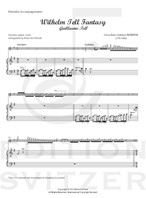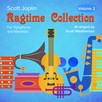
Wilhelm Tell
Composer: Gioacchino Rossini
Instrument: Percussion Duo
Level: Advanced
Published: 2015
Price: €20.00
Item details
-
Description +
-
Arranged by Ronni Kot Wenzell
Duration: 4 min.
Wilhelm Tell (also known as Guillaume Tell (Swiss French), Guglielmo Tell (Swiss Italian), Guglielm Tell (Swiss Romansh), Wilhelm Tell (Swiss German) – or simply Wilhelm Tell (in English)) is a folk hero of Switzerland back in late 15th century, who was forced to shoot an apple off the head of his son, in order not to be executed.
The story of the folk hero fascinated the Italian composer Gioachino Rossini (1792 – 1868), who composed Guillaume Tell; an opera in four acts to a French libretto by Etienne de Jouy and Hippolyte Bis, based on Friedrich Schiller's play Wilhelm Tell. It was premiered by the Paris Opéra at the Salle Le Peletier on August 3rd 1829 (and later in an Italian version in 1831 by Calisto Bassi as Guglielm Tell). This was Rossini's 39th and last opera, after which he went into semi-retirement before dying nearly forty years later. The William Tell Overture became famous and has later been repeatedly used (sometimes as a parody) in many different arrangements and by composers such as Dmitri Shostakovich, Franz Liszt and Benjamin Britten among many others.
Years later, the principal timpanist in Staatoper and professor at Hochschule für Musik in Berlin, Franz Krüger chose to make a fantasy-filled arrangement based on the motives from Rossini’s William Tell Overture. He arranged it for Xylophone solo and Orchestra and named it Tell-Fantasie. The arrangement you’re holding in your hand now, is a re-arrangement of William Tell by marimba soloist Ronni Kot Wenzell for two marimbas based on Franz Krüger’s Tell-Fantasie - made roughly a century later…
Hope you’ll enjoy it!
-
-
Instrumentation +
-
Percussion Duo:
2 Marimbas (and possible 1 Vibraphone)
-
-
About the composer +
-
Gioachino Antonio Rossini (29 February 1792 – 13 November 1868) was an Italian composer who wrote 39 operas as well as sacred music, chamber music, songs, and some instrumental and piano pieces.
His best-known operas include the Italian comedies Il barbiere di Siviglia (The Barber of Seville) and La Cenerentola (Cinderella), and the French-language epics Moïse et Pharaon and Guillaume Tell (William Tell). A tendency for inspired, song-like melodies is evident throughout his scores, which led to the nickname "The Italian Mozart".
Until his retirement in 1829, Rossini had been the most popular opera composer in history.[4] He is quoted as joking, "Give me the laundress' bill and I will even set that to music."
-
-
Reviews +
-
Percussive Notes, November 2016
Ronni Kot Wenzell’s arrangement of “William Tell” is a short, fun addition to the marimba duo repertoire. Although the tune is widely known, a two-marimba version is sure to be a hit among percussionists.
The marimba solo part requires some serious two-mallet chops—extensive double stops, rolls, and a lot of fast sixteenth notes. An accomplished undergraduate percussionist could handle this part, and this piece would make a wonderful showcase piece for a senior recital in lieu of the traditional George H. Green rag.
The marimba accompaniment part is for four mallets and only requires a 4.6-octave marimba for the last three notes. This could easily be arranged for a 4.3-octave marimba, making the piece accessible to more duos and ensembles. The accompaniment part is well written and relies on fairly static harmonic progressions. An accomplished undergraduate would have no problem accompanying a colleague or peer on this piece. While short and sweet, this is a fun arrangement of a well-known work that showcases some lyrical, free two-mallet playing while also demonstrating a lot of chops.
—Justin Alexander
-
-
Credits +
-
Front Cover graphics and layout: Ronni Kot Wenzell
Engraving: Johan Svitzer
Printed in Copenhagen, Denmark
Copyright © Edition SVITZER
www.editionsvitzer.com
-


